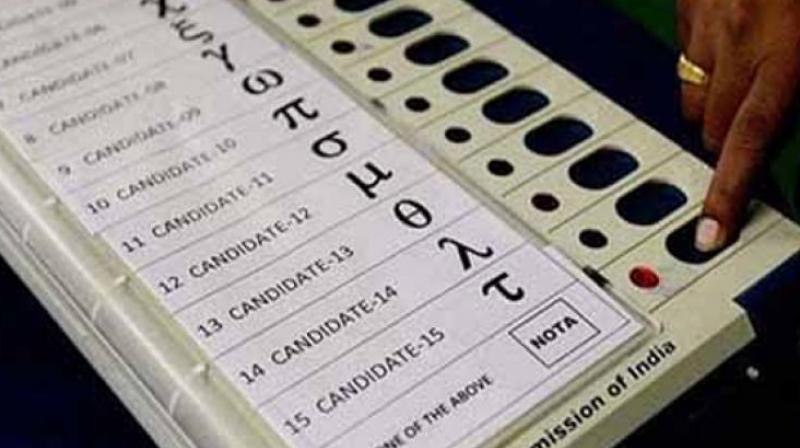Justice for all: Why not re-election where NOTA is winner?
Public angst and cynicism that NOTA reflects, are at best symbolic and of academic value.

Even if 999 voters out of a 1,000 in a constituency press the None Of The Above (NOTA) button on the Electronic Voting Machines (EVMs) the candidate who won the remaining solitary vote will be declared the winner! That's the stark reality of the much hyped 'right to reject' which came to be incorporated in the EVMs from the 2014 Parliamentary Election following a Supreme Court decision in 2013 in Peoples Union For Civil Liberties Vs Union of India. The rationale behind the NOTA option is commendable as it is aimed at preventing bogus voting and giving voters an outlet to register their disapproval of the candidates in the fray.
The Bench in the NOTA verdict, which included the present Chief Justice of India, had held that "giving right to a voter not to vote for any candidate while protecting his right of secrecy is extremely important in a democracy. Such an option gives the voter the right to express his disapproval with the kind of candidates that are being put up by political parties. When political parties realise that a large number of people are expressing their disapproval with the candidates being put up by them, gradually there will be a systemic change and the political parties will be forced to accept the will of the people and field candidates who are known for their integrity." The court hoped that "it would send clear signals to political parties and their candidates as to what the electorate think about them." The possibility of bogus voting was also on the court's mind as it observed that "in the existing system, a dissatisfied voter ordinarily does not turn up for voting, which in turn provides a chance to unscrup
ulous elements to impersonate the dissatisfied voter and cast a vote."
The right not to choose a candidate flows from Section 79(d) of the Representation of People (RP) Act, 1951, which defines an 'electoral right' as "the right of a person to stand or not to stand as, or to withdraw or not to withdraw from being a candidate, or to vote or refrain from voting at an election." But there is a contextual contradiction in the statute. Section 2(d) of the Act lays down the interpretation of 'election' as a process "to fill a seat or seats in either House of Parliament or in the House or either House of the Legislature of a state." It does not say 'not to fill a seat'.
On the ground, the NOTA judgment is an improvement over the earlier Rule 49(o) of the Conduct of Election Rules which required an Entry in Form 17-A under public gaze. It upholds the secrecy of the voting process as provided for in Section 94 of the RP Act. "No witness or other person shall be required to state for whom he has voted at an election." Where does this leave exit polls? Here the words "shall be required" imply that it is only compulsion that is prohibited and not a voluntary disclosure, which is a fundamental right under Article 19(1)(a) of the Constitution. The Supreme Court in Raghbir Singh Gill Vs Gurcharan Singh Tohra clarified that the statutory provision is to "relieve a person from a situation where he may be obliged to divulge for whom he has voted under testimonial compulsion. Secrecy of ballot can be appropriately styled as a postulate of constitutional democracy. It enshrines a vital principle of parliamentary institutions set up under the Constitution. It subserves a very vital public interest in that an elector or a voter should be absolutely free in exercise of his franchise untrammelled by any constraint which includes constraint as to the disclosure."
Even in Parliament, the elected members have three options while voting - Ayes, Noes and Abstain. In that light, the Supreme Court in Lily Thomas Vs Speaker Lok Sabha ruled that "the right to vote means right to exercise the right in favour of or against the motion or resolution. Such a right implies right to remain neutral as well. 'Neutral' means, 'indifferent', unbiased, impartial, not engaged on either side'. Conceptually it is not aligning with cither view."
Several countries like France, Greece and Bangladesh have the NOTA option in their polls. The United States of America, Spain, Sweden and Finland have blank votes or the practice of 'write'in' which is a form of negative voting that allows a voter to cast a vote in favour of a fictional candidate.
Have constituencies in India and across the world, which registered high NOTA votes in the last election seen a change of candidates? Has it had a salutary effect on the quality of candidates put up by political parties? Are there less candidates with criminal antecedents in the fray today? Have candidates seeking re-election nursed their constituencies adequately? If our answer is None Of The Above, then the verdict is clear.
Public angst and cynicism that NOTA reflects, are at best symbolic and of academic value. Why should a vote for no one carry no value? Why should it make no difference to the quality of candidates fielded? Why can't the RP Act be amended to make candidates fear it? Why not declare a re-election with new candidates in constituencies where the NOTA votes are the highest? How can such 'elected' candidates 'represent' the 'will' of the electorate? Isn't the will of the people sacrosanct in a democracy? Till that happens, 'winnability' through money or muscle power will ensure that NOTA is just an exercise to cut your vote to spite your candidate. Voter successful, candidate elected!
(The writer is an advocate at the Madras high court, columnist & author)

